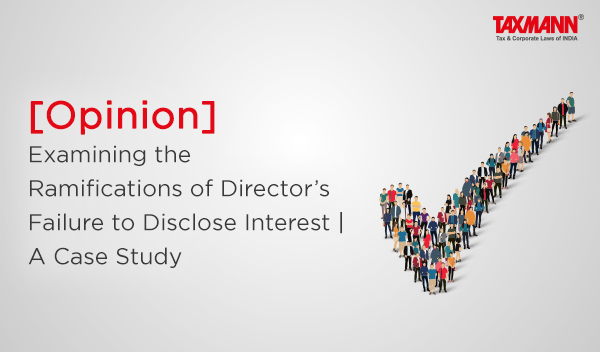[Opinion] Examining the Ramifications of Director’s Failure to Disclose Interest | A Case Study
- Blog|News|Company Law|
- 3 Min Read
- By Taxmann
- |
- Last Updated on 22 November, 2023

Prof R Balakrishnan – [2023] 156 taxmann.com 482 (Article)
1. Disclosure of interest by directors
The framework of the Companies Act 2013 lays down that every director of a company to make disclosure of his interest in any company or firm or body corporate or any association of individuals at the first board meeting or when there is any change in the interest of directors. This provision is based on the principle that the interested director is precluded from dealing on behalf of the company with himself and from entering into any contract/arrangements/engagements in which his personal interest is involved which may be a conflict of interest or which possibly may conflict with the interest of those to whom the director is bound by fiduciary duty to protect. The framework of the Companies Act 2013, does not prohibit such transactions i.e. entering into contract/arrangements/engagements but the law only requires that the disclosure to this effect to be made by the concerned directors stating their interest to their co-directors on the board.
2. Mode of disclosures made by directors & and preservation of the declarations
Every director of a company is required to mandatorily disclose his concern or interest including shareholding interest in any other organisations by giving a notice in writing the in the prescribed form MBP-1 to each such company where he is a director. The disclosure made by the directors in form MBP-1, as received by the company from the directors are required to be presented at the meeting of the board of directors of the company and the board takes note of the same. All such disclosures are required to be kept at the registered officer of the company and the preservation period for the same is for 8 years from the end of the financial year in which it relates and shall be by and large kept in the custody of the company secretary of the company or any other person authorized by the board for this purpose.
3. Maintenance of register for contracts & arrangements in which directors are interested
Every company is required to keep one or more registers giving separately the particulars of all contracts or arrangements under the provisions of the Companies Act 2013 read with relevant rules framed under Companies (Meetings of Board and its Powers) Rules 2014. The regulators have prescribed the form of the register which should be in MBP-4 containing the particulars (a) company or companies or bodies corporate, firms or other association of individuals, in which any director has any concern or interest, as spelled out in the Act; (b) particulars of the company (ies) or bodies corporate in which a director himself together with any other director holds more than two per cent of the paid-up share capital; (c) contracts or arrangements with a body corporate or firm or other entity in which any director is, directly or indirectly, concerned or interested; and (d) contracts or arrangements with a related party with respect to transactions to which are spelled out in the Act applies.
3.1 Presenting the MBP-4 register at the board meeting
The register for contracts & arrangements in which directors are interested i.e. the MBP-4 register (s) is/are required to be placed before the next meeting of the board and signed by all the directors present in the meeting.
Click Here To Read The Full Article
Disclaimer: The content/information published on the website is only for general information of the user and shall not be construed as legal advice. While the Taxmann has exercised reasonable efforts to ensure the veracity of information/content published, Taxmann shall be under no liability in any manner whatsoever for incorrect information, if any.

Taxmann Publications has a dedicated in-house Research & Editorial Team. This team consists of a team of Chartered Accountants, Company Secretaries, and Lawyers. This team works under the guidance and supervision of editor-in-chief Mr Rakesh Bhargava.
The Research and Editorial Team is responsible for developing reliable and accurate content for the readers. The team follows the six-sigma approach to achieve the benchmark of zero error in its publications and research platforms. The team ensures that the following publication guidelines are thoroughly followed while developing the content:
- The statutory material is obtained only from the authorized and reliable sources
- All the latest developments in the judicial and legislative fields are covered
- Prepare the analytical write-ups on current, controversial, and important issues to help the readers to understand the concept and its implications
- Every content published by Taxmann is complete, accurate and lucid
- All evidence-based statements are supported with proper reference to Section, Circular No., Notification No. or citations
- The golden rules of grammar, style and consistency are thoroughly followed
- Font and size that’s easy to read and remain consistent across all imprint and digital publications are applied



 CA | CS | CMA
CA | CS | CMA
